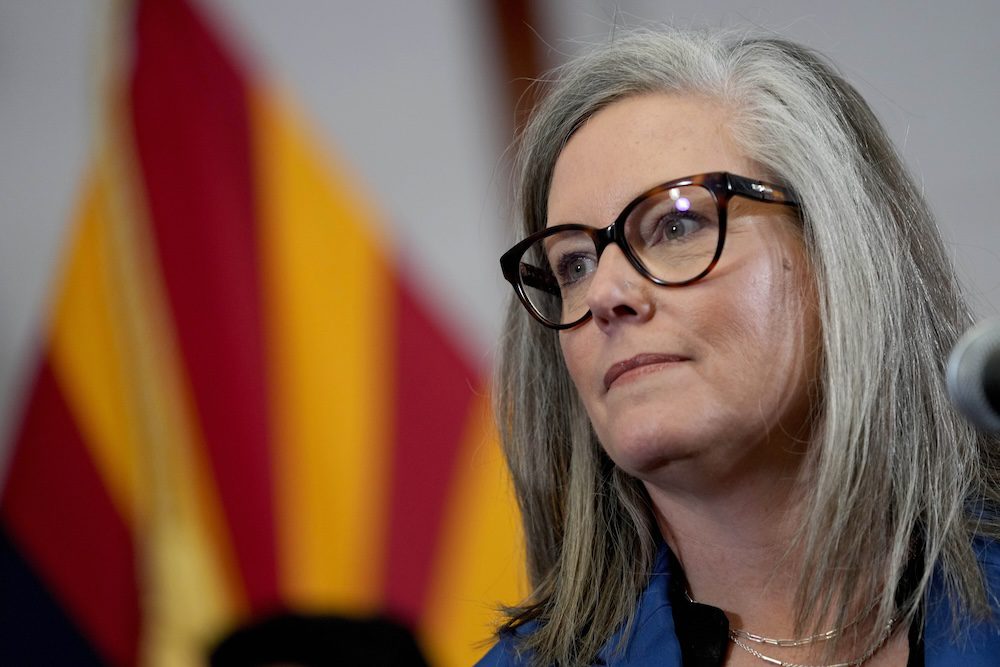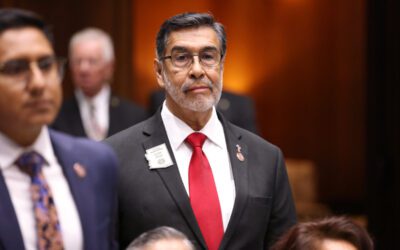
Pro-abortion rights demonstrators rally in Scottsdale, Arizona on April 15, 2024. The top court in Arizona on April 9, 2024 ruled a 160-year-old near total ban on abortion is enforceable, thrusting the issue to the top of the agenda in a key US presidential election swing state. (Photo by Frederic J. Brown / AFP) (Photo by FREDERIC J. BROWN/AFP via Getty Images)
Arizona’s role at the forefront of the climate crisis, defending democratic elections, and protecting reproductive rights has caught the attention of local leaders nationwide who hope to mirror its successes—and avoid its mistakes.
The nonprofit NewDEAL—short for Developing Exceptional American Leaders, and reminiscent of the expansion of progressive public works projects of the 1930s—held a summit of progressive leaders in Phoenix this month to highlight the state’s success in grappling with issues felt by local communities across the country.
Debbie Cox Bultan, CEO of NewDEAL, said Phoenix’s ability to recover from the brutal effects of the COVID-19 pandemic and utilization of federal funds to future-proof the city make it a shining example for cities struggling to recover. In particular, she praised the local-federal partnership through the Biden administration’s CHIPS Act to create high-paying manufacturing jobs that don’t require college degrees.
“Seventy percent of those jobs are not going to require a college degree,” said Bultan. There’s been this gap for so long of high-wage jobs only being available for people with college degrees, so I hope that this is a model that other cities can emulate to ensure that we’ve got high-paying jobs for people with all kinds of educational backgrounds.”

NewDEAL Summit was held in Phoenix this year, where state and municipal leaders from across the country came to learn and discuss ways they could learn from each other and further progress within their communities. Photo courtesy NewDEAL.
According to numbers from the Biden administration, direct funds from the CHIPS Act, coupled with the indirect benefit that comes with it, have brought a $65 billion investment and 25,000 jobs to Arizona. Taiwan Semiconductor Manufacturing Company’s third factory is slated to be built in Phoenix by 2030, solidifying the company’s—and, by extension, the semiconductor industry as a whole’s—long term plans to plant roots in the state.
While economic investments have helped Arizona position itself for a robust future, Summit attendees expressed concern that the looming presence of its pre-statehood abortion ban could stymie its potential. Arizona Corporation Commissioner Anna Tovar, who served in the state legislature when the anti-immigration SB 1070 law was passed, predicted the ban will have ramifications similar to those felt when the controversial “show me your papers” law went into effect.
“We have to look at the overall picture in regards to what these draconian bills can do,” Tovar told The Copper Courier. “Not only for women in our state that may need to choose to have an abortion as part of their healthcare in order to save their lives and have that choice and have that freedom to make that choice, but also looking at the consequences of what can happen from an economic standpoint.”
A study by the Center for American Progress found that, in the first year after SB 1070 was passed, Arizona saw a loss of over $250 million in economic revenue—$141 million from conference cancellations alone—and nearly 3,000 jobs lost.
The law’s passage also ignited a generation of community activists who successfully fought to overturn the law, recalled and voted out elected leaders who supported it, and ushered in a cadre of progressive political leaders like Rep. Ruben Gallego and congressional candidate Raquel Terán. A similar energy can be felt with opposition to the state’s strict abortion laws, as a ballot proposition to make abortion access a constitutionally protected right has received more support than any other citizen initiative in state history.
“There are some similarities where we have constituencies that are very upset, that have a wide range of emotions,” Tovar said. “Let’s channel those emotions in a positive way so that we can make the changes that we want to see in Arizona. And number one, that’ll come November, when we have the Arizona Access for Abortion measure on the ballot. So there are productive ways to channel those type of emotions, just as we did with SB 1070.”
Bultan also spoke of the impacts such extreme abortion bans can have, based on what she’s heard from NewDEAL leaders in other states where bans have already gone into effect.
“I’ve talked to other legislators and other elected officials all over the country,” Bultan said. “In some of those states where they have had total bans or near total bans, or they’ve already seen the impacts. They’re seeing the impacts of people wanting to come to their states or cities for school or for jobs.”
An analysis by the US Congressional Joint Economic Committee found that in states with strict abortion laws, child poverty rates are higher, wages for women are lower, and healthcare overall is less accessible and more expensive than in states that offer abortion-related healthcare.
Arizona’s total ban on abortion goes into effect June 8, but a joint effort by Gov. Katie Hobbs and Attorney General Kris Mayes will prevent patients and providers from being prosecuted under this law.
Support Our Cause
Thank you for taking the time to read our work. Before you go, we hope you'll consider supporting our values-driven journalism, which has always strived to make clear what's really at stake for Arizonans and our future.
Since day one, our goal here at The Copper Courier has always been to empower people across the state with fact-based news and information. We believe that when people are armed with knowledge about what's happening in their local, state, and federal governments—including who is working on their behalf and who is actively trying to block efforts aimed at improving the daily lives of Arizona families—they will be inspired to become civically engaged.


This OB-GYN is concerned about Arizona’s rural maternity care deserts
NEED TO KNOW: 6 Arizona counties have fewer than 1 OB-GYN per 10,000 women. Of those, Greenlee County had no obstetric care providers in the entire...

Trump administration revokes guidance requiring hospitals to provide emergency abortions
WASHINGTON (AP) — The Trump administration announced on Tuesday that it would revoke guidance to the nation's hospitals that directed them to...

House GOP fast-tracks budget bill that would cut off Medicaid funding to Planned Parenthood
The budget package proposes steep health care cuts—and includes a new push to block patients from accessing reproductive care. In a 30-24 party-line...

Bill aimed at combating postpartum depression signed into law by Gov. Katie Hobbs
Making childbirth safer and making rural reproductive health care better are the goals of a new bill in Arizona, which Gov. Katie Hobbs signed into...





